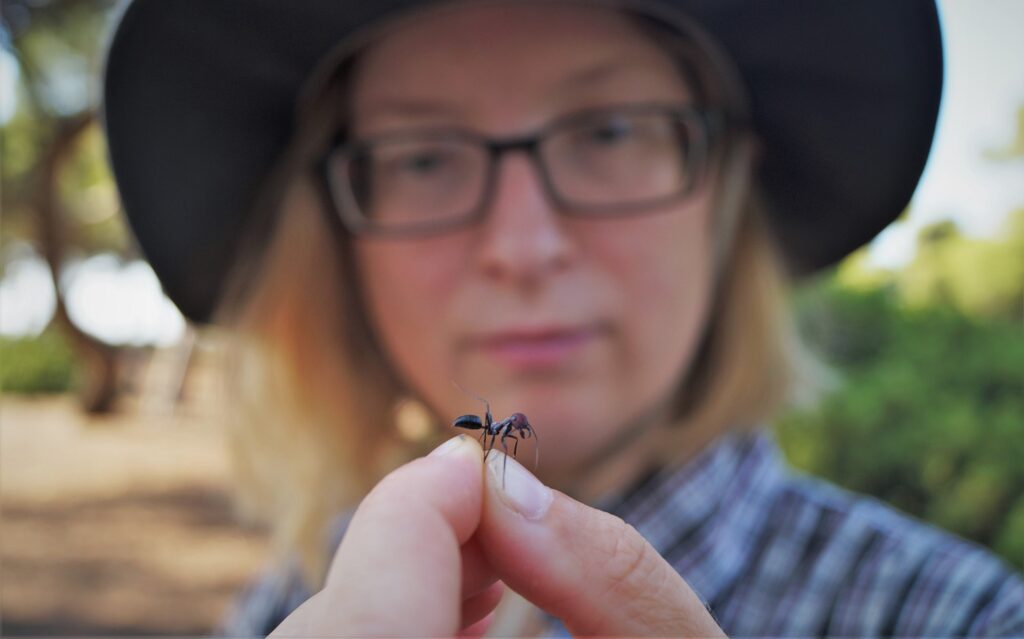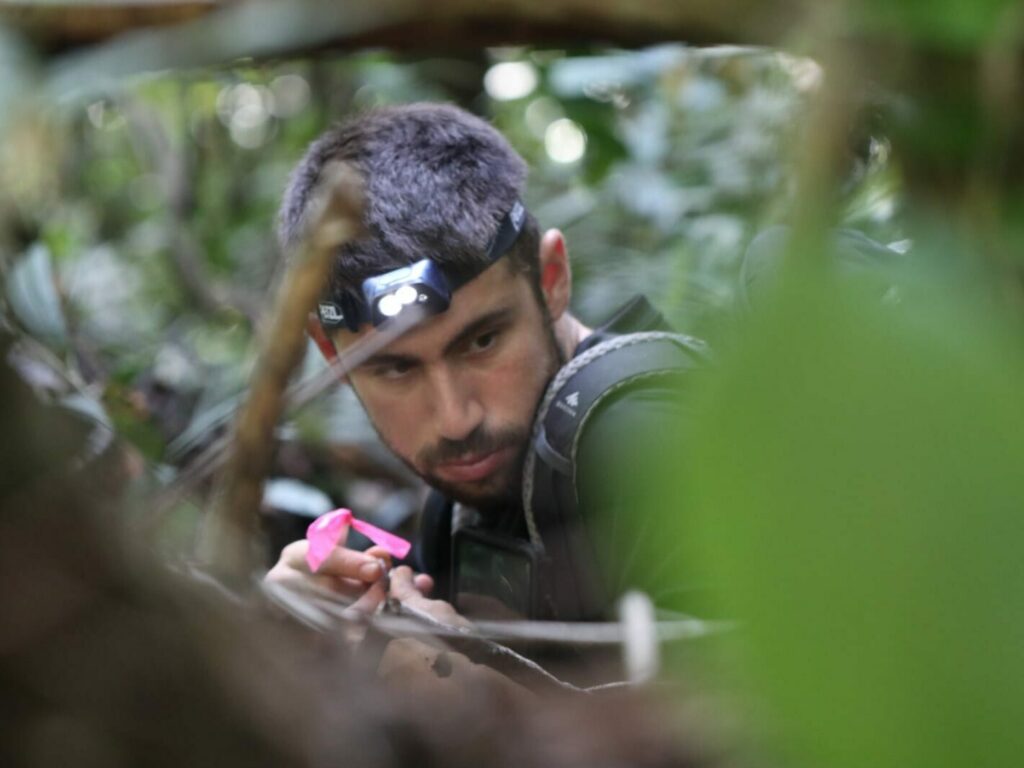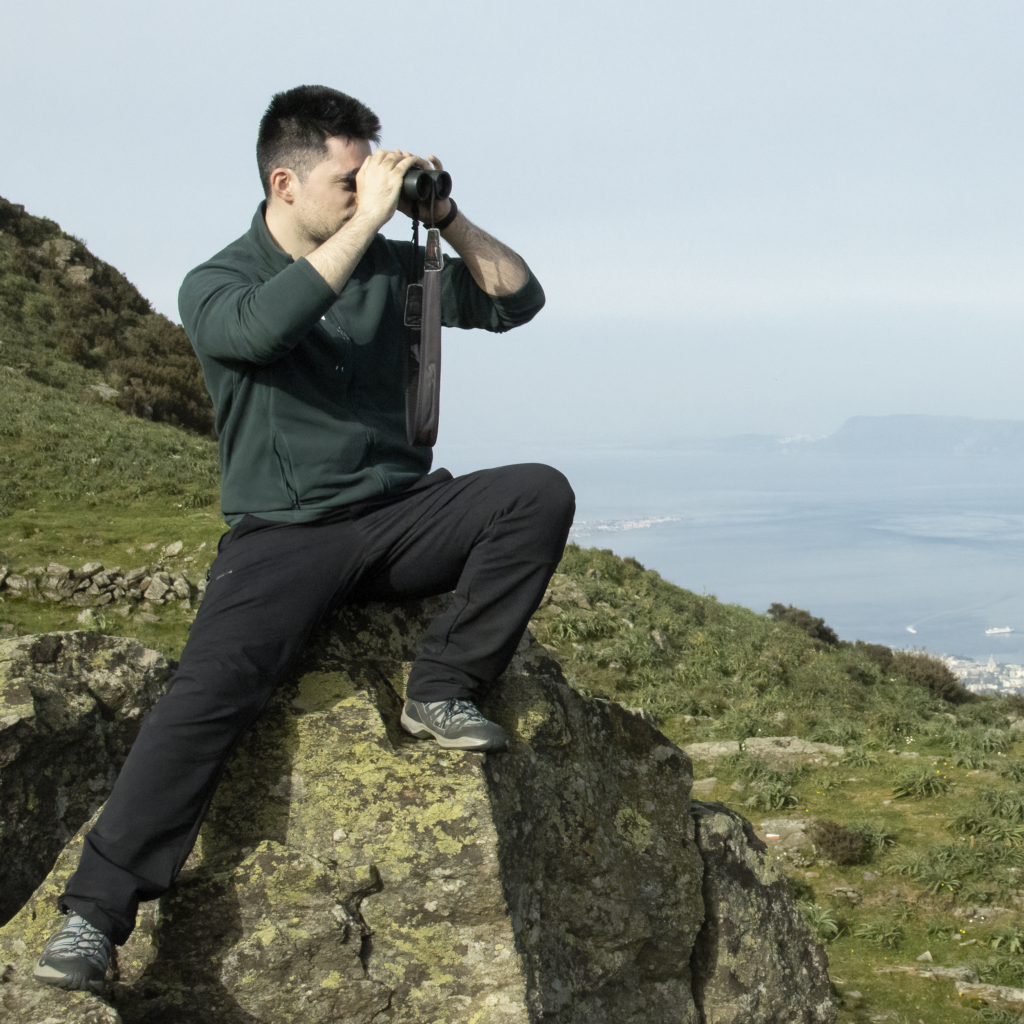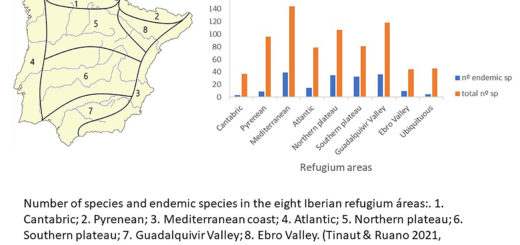Navigating through the postdoc career while exploring navigation systems in Cataglyphis desert ants
Desert ants of the genus Cataglyphis have long fascinated ethologists for their navigational skills and adaptations, providing textbook examples for the study of orientation in animals, and after decades of research still spark plenty of new discoveries. Here we interviewed Pauline N. Fleischmann, currently a postdoc researcher at the University of Oldenburg (Germany), who has followed the topic since the time when she started her PhD project, several years ago. Pauline gives us an insight on navigating the researcher career, advancing through work challenges while driven by enthusiasm for myrmecology and science.

An Interview compiled by Enrico Schifani and Salvatore Brunetti


MNB: What is the topic of your research project?
PNF: We are interested in the role of the magnetic sense for navigation in Cataglyphis desert ants. Cataglyphis ants are solitary central place foragers (Fig.1) and their navigational skills have been subject to neuroethological studies for decades. During my PhD project under the supervision of Wolfgang Rössler and Rüdiger Wehner, we investigated how ants learn to navigate, i.e. how they acquire information needed for navigation as foragers and how they calibrate their compass systems. Our discovery that the ants use the geomagnetic field to align their gaze directions during learning-walk pirouettes opened up several follow-up questions. We now aim to understand the magnetic sense in Cataglyphis better, by studying how desert ants detect, process, integrate and use magnetic information for navigation.

MNB: In which year of your PostDoc studies are you now?
PNF: It depends a little bit how you count, I assume 5th year is correct. I defended my PhD thesis in March 2018 and my first son was born three weeks later. During my parental leave, I wrote a grant application which was approved so that I continued my research on the celestial and magnetic compass systems of ants in Würzburg and Greece in 2019. After my first postdoc, I got my second child in 2022 and after six months of maternity leave, I started my current position as a CRC research group fellow associated with the Collaborative Research Center (CRC) 1372 “Magnetoreception and navigation in vertebrates: from biophysics to brain and behavior” at the University of Oldenburg (Germany).
MNB: Why ants? Could you elaborate a little bit more on that?
PNF: During my bachelor studies in Berlin, I was student assistant in Bernhard Ronacher’s group. My main task was to take care of their experimental models, grasshoppers, but when a PhD student was looking for field assistants to help with experiments with the saltpan ant Cataglyphis fortis in Tunisia, I got the chance to meet them for the first time. Actually, I fell in love with the desert and their long-legged inhabitants immediately.
MNB: How do you feel about fieldwork?
PNF: Fieldwork is key element of my research, and my favorite task as a scientist. (Fig. 2)

MNB: And how about identifying ants using a key?
PNF: To be honest, I am very happy that my study species is easily identifiable.
MNB: Do you enjoy working in the wet lab?
PNF: Some knowledge can only be gained involving lab techniques and I actually consider the combination of fieldwork and labwork as the key to success of our research. However, if I personally have the choice between fieldwork and labwork, I will always choose fieldwork.
MNB: Maybe you have not, but have you been involved in any of the -omics approaches, and what was your experience?
PNF: Until now, I was not involved in any of those approaches, but I aim to change that in the future. Along with a colleague of mine, Miriam Liedvogel, who is an evolutionary biologist, I plan to have a project focusing on molecular genomic tools.
MNB: Now a slight change in topic: Did you acquire your statistics knowledge in university courses, from your supervisor, or on your own?
PNF: It was a mix. I had a general introduction into statistics, and my supervisor taught me the basics of circular statistics, but to actually learn statistics you must do it yourself. I constantly expand my statistical skills.
MNB: What is the ideal frequency of meeting your supervisor for discussing your research from your point of view: daily, weekly, monthly?
PNF: I think, there is no general schedule, but the ideal frequency depends on both the student and the supervisor as well as on the project. At the University of Oldenburg, PhD students must have a meeting with their committee at least once per semester. I have a weekly meeting with my team where we update each other about the progress and discuss potential problems. In addition to that, I offer personal meetings to all my students whenever it is needed, e.g. to discuss data, to organize the experiments or to set up a time table for the projects.
MNB: And in an ideal world, is the working group you belong to small or large?
PNF: I consider a medium-sized group to be ideal. I enjoy being part of different projects, but I also want to have the time to discuss things in person with the people involved.
MNB: Do you like discussing ideas or problems with fellow scientists?
PNF: I enjoy exchanges about scientific ideas and problems with fellow scientists very much. To get input from the outside helps to sort own thoughts, and it challenges own approaches.
MNB: How many papers do you read in an average week?
PNF: Reading papers is usually correlated with having a reason to read them, and therefore, it varies how much I read. I am co-organizing a Journal Club that means that I read at least one paper per week. When I write papers or grant applications, I usually search for literature and (re-)read papers. And of course, I also try to keep up with interesting research papers that are published and depending on my capacities, I read those immediately or put them on my to-be-read list.
MNB: And ideally, is your university close to your fieldwork site or in an urban area?

PNF: My field sites are remote places in the Tunisian salt pans (Fig.3) or the Greek pine forests (Fig.4), and I enjoy that very much, even though it has some practical disadvantages as well, e.g. long distance travels and with that a seasonality of when you can perform experiments. Besides that, I am very happy that our campus is very green, because I enjoy to be surrounded by nature even though I do not perform my own research there.

MNB: Have you profited more from attending conferences with narrower or with broader scope?
PNF: From both, but the advantages are differently. Conferences on very specific topics are intense and enable you to have many crucial discussions and to get an update about what is currently going on in your own research field. Conferences with a broader scope give you the chance to learn completely new things and to think outside the box.
MNB: What is most relevant to you at a conference: attending talks, giving a talk, meeting senior scientists, or meeting students?
PNF: The most important thing for me is to exchange with other scientists face to face. This became especially clear after all the conferences had been cancelled during the pandemic. There were several virtual replacement events. Of course, it is possible to listen to a virtual talk or look online at posters, but what you cannot replace are the personal discussions. At least for me it makes a huge difference whether you actually meet people or whether you ask questions online.
MNB: Did you ever participate in a science slam and if so, would you do it again?
PNF: Until now, I gave one Science Pub Talk, which I liked very much and would definitely do it again. I enjoy sparking my excitement for science to different target groups, and popular science talks are one possibility to engage interest of the general public.
MNB: If you would get 100,000 Dollars to spend for your research project, what would you do with it?
PNF: Since I have a running grant for my current projects, I would use it to explore new possibilities for additional projects, e.g. traveling to a desert where I have never been before and get to know other desert inhabitants. I would love to experience Ocymyrmex and Melophorus ants in their natural habitats in Namibia and in Australia, respectively.
MNB: And in your spare time – what helps you to relax from work?
PNF: I do not have much spare time at the moment. We have two sons, six years and two years old. I would not call it “relaxing”, but they definitely distract me from work and keep me busy. I am very happy, proud, and thankful (especially to my husband) that I can have both a scientific career and a family. And showing my research to my kids is one of the most rewarding aspects of it. (Fig.5)

MNB: How do you celebrate successes like getting a paper accepted, a proposal granted, or the like?
PNF: Usually I tell others about these success and we celebrate a bit.
MNB: What is your personal trick to get over periods of low(er) motivation?
PNF: In phases where I am less successful or things are stressful, I remind myself of those successes we were talking about, e.g. by reading an acceptance letter again to cheer myself up.
MNB: And if you could turn back time – what is the one thing you would do differently when starting your PhD thesis again?
PNF: I am not sure that I would change something because then maybe everything went differently, and I am quite happy with my scientific path so far.
MNB: Would you like to stay in science?
PNF: Yes, that is my goal.
MNB: If you will be supervising PhD students yourself one day, as a supervisor, what is the most important thing you would expect from your students?
PNF: I expect that students follow the rules of good scientific practice, that they know what they are doing, and that they are self-responsible.
MNB: And tying to this – what will be the most important thing you will want to take care of in supervising?
PNF: My aim is to help them becoming experts of their projects. They should have the theoretical background, practical skills and confidence to plan and perform their experiments and to analyze and discuss their results and I try to teach them my knowledge, train them how to do experiments and support them in becoming scientists.
MNB: Which other scientists (PostDocs, or PhD students) would you like to see featured in a Myrmecological News interview?
PNF: My long-term collaborator and friend Dr. Christos Georgiadis from the University of Athens who I admire for his profound knowledge of ants in Greece would definitely be a great choice. In addition, I hope that students from my lab will also qualify for being featured as “anthusiasts” in the future – this will for sure be also a milestone of my career.
MNB: Original article or review article?
PNF: Original article
MNB: Reading or writing?
PNF: Reading
MNB: Writing or reviewing?
PNF: Writing
MNB: Table or figure?
PNF: Figure
MNB: Web of Science or Google Scholar?
PNF: Google Scholar
MNB: Windows, OS, or Linux?
PNF: Windows (*sigh*)
MNB: Command-line or graphical-user interface?
PNF: Depends on the task. I like programs with graphical-user interface, but for example I use Matlab for data analysis, and there using the command-line is much more efficient.
MNB: Mouse or touchpad?
PNF: Mouse
MNB: Facebook or Twitter?
PNF: I really liked twitter, but since it is X, I have not found a good alternative, and I am stuck there (@Cataglyfilosofi)
MNB: Bus or bike?
PNF: VW bus for the field season! To commute between home and university: bike.
MNB: Sun or rain?
PNF: Sun – when it rains, the desert ants stay inside.
MNB: Diploid or haploid?
PNF: Haplodiploidy
MNB: Sting or acid?
PNF: Thermophile
MNB: Social parasite or host?
PNF: Myrmecophory – everyone wants to be an ant!
MNB: Your favourite ant?
PNF: Dessert ants [sic!] (Fig. 6)






Recent Comments